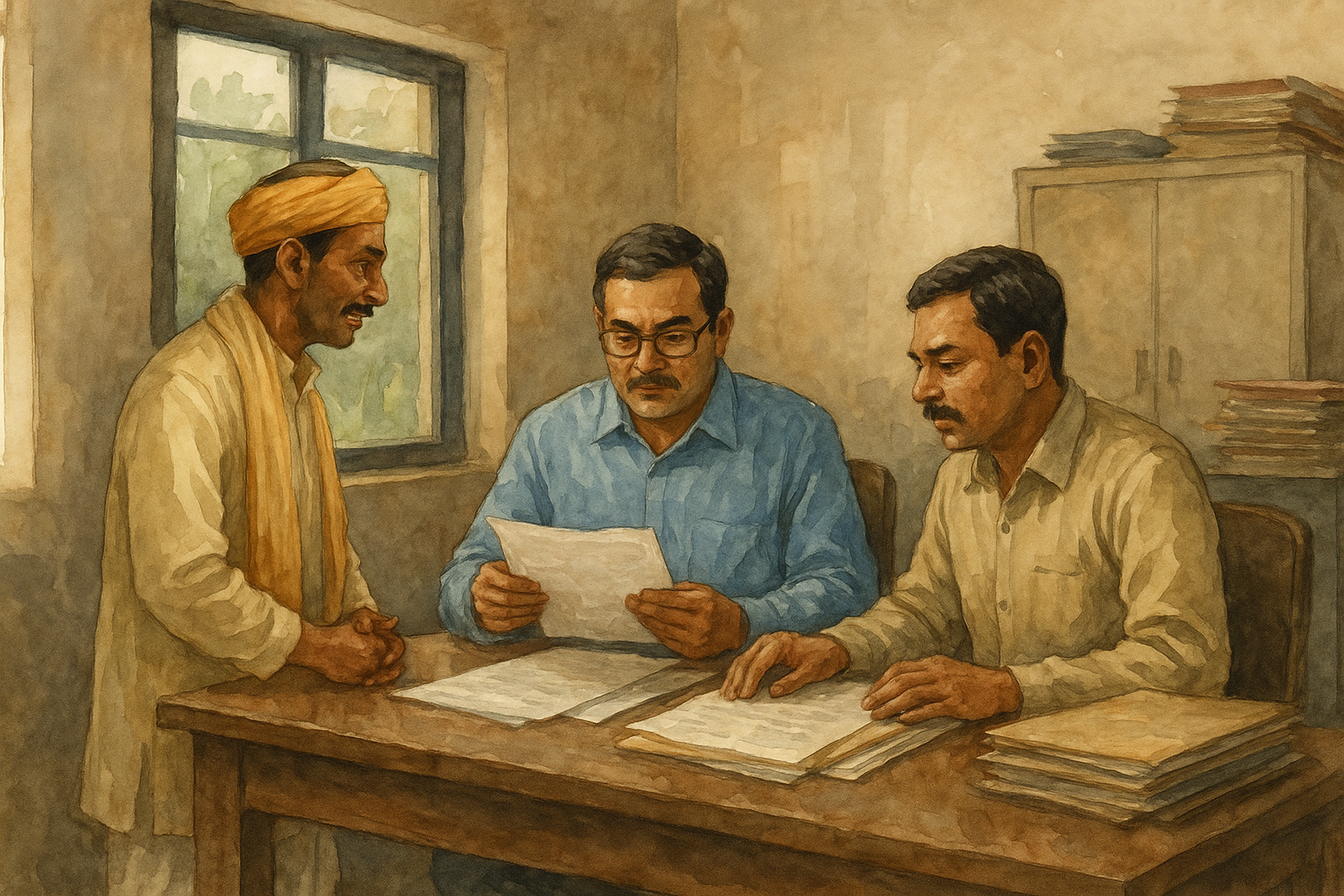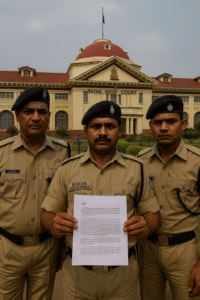The Patna High Court, in a 2021 oral judgment delivered by Hon’ble Mr. Justice Vikash Jain, addressed whether a public works tender could be rejected at the technical stage solely because the affidavits filed by the bidder bore advocate welfare stamps of a lower denomination than required. The Court held that such a shortfall was a rectifiable, non-essential defect and directed the authorities to open the petitioner’s technical bid.
In this writ petition (CWJC No. 6204 of 2020), the dispute arose from a Notice Inviting Tender (NIT) for initial rectification and ordinary maintenance of rural roads under the PMGSY scheme. The petitioner’s technical bid for two packages was rejected by departmental memos dated 22/23.05.2020, citing that the affidavits enclosed with the bid carried advocate welfare stamps of ₹15 instead of ₹25, as allegedly mandated by a departmental communication dated 29.01.2020 and by Sections 22 and 23 of the Bihar State Advocates’ Welfare Fund Act, 1983 (as amended in 2019).
The petitioner argued that even if there was a deficit in stamp value, the authorities were required to provide a reasonable opportunity to cure the defect rather than rejecting the bid outright. Reliance was placed on the Supreme Court decision in Rashmi Metaliks Ltd. v. Kolkata Metropolitan Development Authority, (2013) 10 SCC 95, which distinguishes essential tender conditions from collateral ones and allows rectification of collateral deficiencies.
The State countered that the stamp requirement was statutory and that documents with deficit advocate welfare stamps could not be received or entertained under Section 23 of the 1983 Act. Private respondents added that the NIT allowed no relaxation, making the defect fatal.
After hearing all sides, the Court emphasized the established distinction between essential and collateral terms in tender law—drawing on Rashmi Metaliks and earlier Supreme Court precedents such as Tata Cellular v. Union of India, (1994) 6 SCC 651, and Kanhaiya Lal Agrawal v. Union of India, (2002) 6 SCC 451. The Court underscored that non-adherence to collateral clauses—those not going to the core of eligibility or performance capability—should ordinarily be permitted to be cured.
On facts, the bidder had filed affidavits with welfare stamps—albeit of a lower value—placing the case on “a somewhat better footing” than Rashmi Metaliks, where the tenderer had not filed the latest income-tax return at all. The Court held that the deficit stamp was a non-essential, collateral defect not touching the bidder’s capacity to perform; consequently, the authorities ought to have granted an opportunity to rectify the shortfall instead of rejecting the technical bid.
Addressing the State’s statutory objection, the Court acknowledged that affixation of the proper stamp value is a mandatory requirement. Yet, drawing upon the remedial spirit of Section 28 of the Court-fees Act—permitting validation of inadvertently under-stamped documents upon proper stamping—the Court reasoned that an inadvertent shortfall should not be treated as incurable in every circumstance.
Ultimately, the Court set aside the impugned memos “to the extent they relate to the petitioner” and directed the department to open the petitioner’s technical bids, with all consequential steps to follow.
Significance or Implication of the Judgment (For general public or government)
This decision is significant for procurement administrators and bidders alike. It clarifies that not every deviation in tender documentation warrants outright rejection. When a lapse is collateral—such as a shortfall in the value of an advocate welfare stamp on an affidavit—it should ordinarily be treated as curable if it does not undermine the bidder’s competence or the integrity of the competition. The ruling thus promotes fair competition, reduces litigation arising from hyper-technical disqualifications, and aligns government contracting with principles of proportionality and reasonableness.
For government departments, the ruling is a reminder to design and administer tender conditions in a manner that distinguishes essentials (e.g., qualifications, experience, financial capacity) from collateral procedural requirements (e.g., certain document formats or minor stamp shortfalls), and to offer bidders a reasonable opportunity to cure rectifiable defects. This approach can lead to more robust participation, better pricing, and reduced risk of arbitrary disqualifications being overturned in court.
For bidders, the case provides a persuasive precedent to seek rectification opportunities where an error is procedural and does not affect core eligibility. That said, bidders should continue to exercise strict compliance—particularly with statutory requirements—to avoid unnecessary disputes; but if an inadvertent slip occurs, this judgment supports a rectification-first approach rather than instant exclusion.
Legal Issue(s) Decided and the Court’s Decision with reasoning
- Whether a technical bid can be rejected outright for deficit advocate welfare stamps on affidavits enclosed with the bid.
• Decision: No; such deficit is a collateral, rectifiable defect that does not reflect on the bidder’s capacity to perform. Authorities should grant an opportunity to cure. Reasoning: Applying Rashmi Metaliks (2013) 10 SCC 95 and the essential/collateral distinction in tender law, the Court held the defect to be non-essential and remediable. - Whether statutory provisions (Sections 22–23 of the Bihar State Advocates’ Welfare Fund Act, 1983) bar consideration of under-stamped affidavits at the threshold.
• Decision: While proper stamping is mandatory, inadvertent shortfalls may be permitted to be rectified; an outright bar is not warranted in all circumstances. Reasoning: The Court invoked the remedial spirit of Section 28 of the Court-fees Act to validate inadvertent under-stamping upon proper stamping, emphasizing proportionality and fair play. - Appropriate relief.
• Decision: The impugned memos rejecting the technical bid were set aside (as to the petitioner), and the department was directed to open the petitioner’s technical bids, with consequential actions to follow.
Judgments Referred by Parties (with citations)
- Rashmi Metaliks Ltd. & Anr. v. Kolkata Metropolitan Development Authority & Ors., (2013) 10 SCC 95. Relied upon to show collateral, rectifiable tender conditions.
Judgments Relied Upon or Cited by Court (with citations)
- Rashmi Metaliks Ltd. & Anr. v. KMDA & Ors., (2013) 10 SCC 95. Distinction between essential and collateral tender terms; rectification principle.
- Tata Cellular v. Union of India, (1994) 6 SCC 651. Judicial review of administrative action, Wednesbury reasonableness.
- Kanhaiya Lal Agrawal v. Union of India, (2002) 6 SCC 451. Essential vs. collateral terms; proportionality.
Case Title
Petitioner v. State of Bihar & Ors. (formal cause title abbreviated)
Case Number
Civil Writ Jurisdiction Case (CWJC) No. 6204 of 2020.
Citation(s)
2021(2) PLJR 331
Coram and Names of Judges
Hon’ble Mr. Justice Vikash Jain.
Names of Advocates and who they appeared for
- For the petitioner: Mr. Suresh Pd Singh No. 1, Ms. Kumari Rashmi, Mr. Aditya Raj.
- For the State: Mr. Vikash Kumar, SC-11.
- For the private respondents: Mr. Anshul; Mr. Chandra Mohan Jha.
Link to Judgment
https://patnahighcourt.gov.in/viewjudgment/MTUjNjIwNCMyMDIwIzEjTg==-pLDdR9L7FM8=
If you found this explanation helpful and wish to stay informed about how legal developments may affect your rights in Bihar, you may consider following Samvida Law Associates for more updates.








